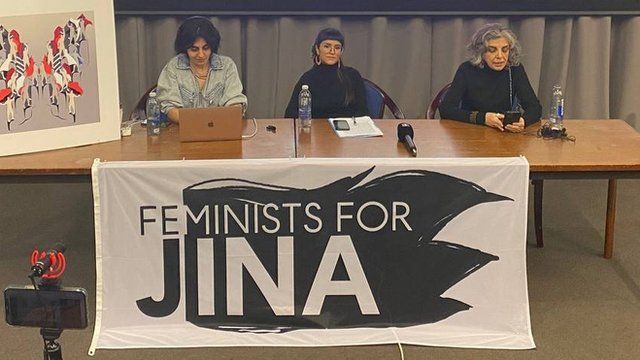A global network of feminist collectives and activists, known as “Feminists for Jina,” is amplifying the voice of the ongoing “Jin, Jiyan, Azadî” Revolution in Iran and working to strengthen its transnational elements. The group comprises individuals from diverse backgrounds and perspectives, united in their goal to fight for equality and freedom.
The “Jin, Jiyan, Azadî” Revolution has become a unifying force for those in the diaspora, with Jina serving as a symbol of their fight. The group aims to connect with other feminist liberation movements and people inside Iran to create a better world, free from oppression and discrimination.
The group is committed to imagining a different world, where basic human needs are provided for everyone, and where religion, language, physical ability, race, and ethnicity are not sources of privilege or discrimination. They envision a world where humans and the earth are treated with justice, and where hope is restored for a positive relationship with nature.
At a press conference held at Suez University in London, they took aim at “alternatives from above,” stressing their ongoing ties to Iran and regional movements. The event was organized by the “Feminists for Gina” network, which has been staging protests and rallies in more than 20 cities worldwide.
Speaking at the conference, renowned women’s rights advocate Parveen Ardalan blasted the pursuit of “alternatives from above,” cautioning that such an approach “will not lead to structural transformation.” Instead, Ardalan warned, such top-down solutions “perpetuate the patriarchal structure,” and run counter to the needs and aspirations of free women everywhere. And while we may recoil at the excesses of the Islamic dictatorship, Ardalan cautioned against embracing the monarchy – whether with individual or constitutional leadership, or the promise of a “good king.” She took issue with the “generalizations and dumb slogans” that too often dominate public discourse, instead stressing the need for imaginative, forward-looking solutions to the challenges posed by the Islamic Republic.
For her part, Ardalan focused on the need to grapple with the difficult question of what comes next, in a world that has moved beyond tyranny. “The main issue is how to act so that after passing the tyranny of the Islamic Republic, we will not be caught in the tyranny again,” she stressed. Against this backdrop, Ardalan suggested that the key question we must ask is not which alternative government model we prefer – be it a republic, a monarchy, a constitutional monarchy, or a federal system – but rather how we can build a society that truly meets the needs of its citizens.
In the words of a member of the “Feminists for Jina” network, the recent protests in Iran are “a revolution that is moving and being built from the bottom up,” with “thunderous consciousness impulses and the collapse of the walls of authority and fear of this centrist Shiite dictatorial government.”
Parvin Ardalan, a prominent feminist activist, explained that the network’s activities are distinguished by “the content of what we draw for democracy and in the method of building it, and not just in presenting new forms and forms of government.” Ardalan emphasized the importance of feminist political forces in resisting authoritarianism, especially in the current revolutionary situation.
The event also featured a diverse range of speakers, including Afghan filmmaker and activist Sahar Fitrat, queer activist and psychotherapist Sabra Rezaei, feminist activist and researcher Haujin Bagali, Kurdish woman activist and anthropologist Elif Sarijan, and artist and petitioner activist Prasto Forohar, who presented a project titled “The Butterfly of Revolution Women.”
Messages were also sent by former political prisoners Raha Askarizadeh and Leila Hosseinzadeh, as well as a group of feminist activists in Tehran. The “Feminists for Jina” network aims to amplify the feminist voice of the “Free Life Woman” revolution outside of Iran and strengthen the transnational aspects of the movement.
Parvin Ardalan, a prominent voice in the “Feminists for Jina” network, declared, “We are in continuous dialogue with activists inside Iran, and together we scrutinize micro and macro social and political structures, from the alternatives to state power to familial and educational relations. We will not stand idly by.”
Ardalan emphasized the network’s connection with “transnational liberation forces,” noting the active involvement of Kurdish and Baloch feminists in challenging Iran’s authoritarian regime and intra-national masculine structures, subverting centrist feminist discourse.
In commemoration of International Women’s Day, the “Feminists for Gina” network has hosted various events and conferences in cities worldwide, including Berlin, New York, Paris, Utrecht, Seattle, Northern California, Florence, and Melbourne.
According to the network’s website statement, “The form of struggle is no longer the same as before.”
The Jina Revolution is life itself that blooms on the fabric of decay and ruin: an uproar at the intersection of gender discriminations, economic and ethnic discrimination, an irreversible rupture, transformation of the voice of protest for change, to change itself. A change in all multifaceted relations: from political structures to other patriarchal institutionalised and established structures of society, economics, nation and religion.
The Jina Revolution builds upon widespread feminist movements in Iran, marking a paradigm shift and a new phase of history. The network envisions “feminist struggles after the Gina Revolution” as an ongoing process, expanding its alliance with freedom and justice movements combating discrimination.








